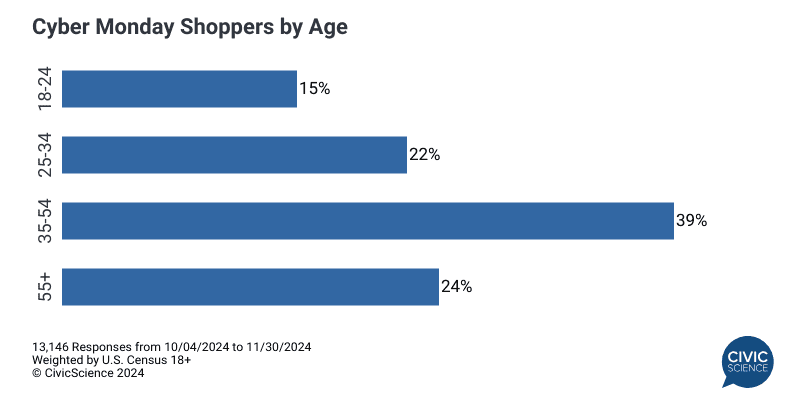This article’s data came from CivicScience’s database via our AI content generation tool, DataScribe, which supported its creation. Get access here.
Cyber Monday continues to captivate American shoppers. CivicScience data reveals that over a quarter of U.S. adults (26%) self-report they are Cyber Monday shoppers and plan to take advantage of the online deals this year. This makes Cyber Monday the second most popular shopping day of the Thanksgiving holiday weekend, trailing behind Black Friday. The poll, conducted among over 13,000 respondents, highlights demographic trends that set the Cyber Monday shopper apart from those who prefer other days or opt out of shopping altogether during Thanksgiving weekend.
One of the most striking findings is the age distribution of Cyber Monday shoppers. While all age groups have some intent to shop, the most represented age groups planning to shop on this day are ages 35-54.

Gender also plays a role in Cyber Monday shopping habits. Women are more inclined to shop on Cyber Monday than men, making up 56% of the Cyber Monday shoppers. This contrasts with the gender distribution on Black Friday, where the split is slightly more balanced. The data suggest that women may be more drawn to the convenience and variety of online shopping deals.
Join the conversation: Have you shopped for yourself while holiday shopping for gifts?
Income levels further differentiate Cyber Monday shoppers. Those with an income under $25,000 are less likely to shop on Cyber Monday than other days, indicating that higher-income individuals might be more inclined to participate in this online shopping event. This could be due to the perception that Cyber Monday offers better deals on higher-end products, appealing to those with more disposable income.
Urbanicity also influences shopping behavior. Suburban residents are the most likely to shop on Cyber Monday, with 45% of respondents from the suburbs planning to participate. This is a consistent trend across all shopping days, but the preference for Cyber Monday is particularly pronounced among suburbanites, possibly due to better internet access and a preference for avoiding crowded stores.
Parental status also plays a role in Cyber Monday shopping intentions. Parents and grandparents are slightly less represented among Cyber Monday shoppers than on other Thanksgiving shopping days, with 43% of parents and 18% of grandparents planning to shop. This data could indicate that Cyber Monday is more appealing to individuals without the time constraints of parenting responsibilities.
Other Insights on the Cyber Monday Shopper
- CM shoppers are tech-savvy and are more likely to use online services and apps for many other aspects of their lives.
- They need to catch up on their holiday shopping compared to non-CM shoppers.
- More likely than last year to use Buy Now, Pay Later options for holiday purchases.
Overall, CivicScience data paint a vivid picture of the typical Cyber Monday shopper: a younger, suburban, and educated individual, often women, with a moderate to high income. These insights highlight the evolving landscape of holiday shopping and the importance of understanding demographic trends to better cater to consumer preferences. As Cyber Monday continues to grow in popularity, retailers may find it beneficial to tailor their marketing strategies to these critical demographics, ensuring they capture the attention of this eager and diverse group of shoppers.
Join the conversation: Do you buy a Christmas gift for yourself?








